CURRICULUM
Cosmos Castle International school Green Campus is affiliated to CBSE New Delhi which conducts the AISSE and AISSCE examinaton for Class-10 and 12 respectively
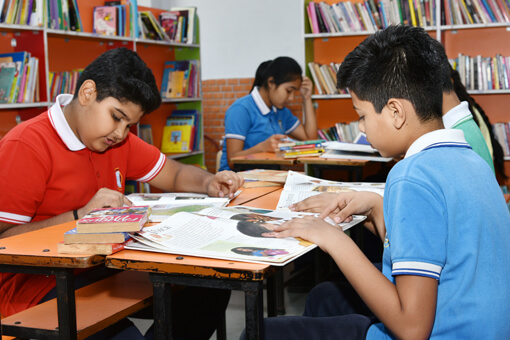
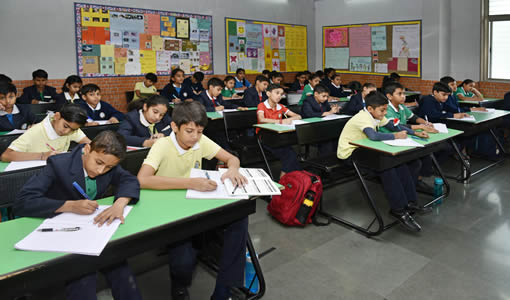
TEACHING METHODOLOGY
Teaching pedagogy at Cosmos Castle International school Green Campus is carefully crafted with a vision of a happy, confident and socially adjusted child. Our focus is on:
- Child centered learning.
- Active involvement of students in class.
- Providing conducive platform for self learning and development.
- Close supervision for slow learners.
- Regular Assessments.
At Cosmos Castle International School Green Campus we adopt:
- Activity based learning.
- Differential ( Inclusive) learning.
- Blended learning.
- Flipped Learning.
LEARNING DOMAINS
- Language and Literacy (Listening, Reading, Writing & Communication skills)
- Numeracy (Mathematical thinking and reasoning)
- Personal, Social & Emotional Development (Self Awareness & Social Awareness)
- Discovery of the World – (Environmental awareness)
- Motor Skills development (Physical & Health Education)
- Aesthetics & Creative Expression (Art Education)

PRIMARY AND SECONDARY SECTION CLASS 1, 2 TILL CLASS 8
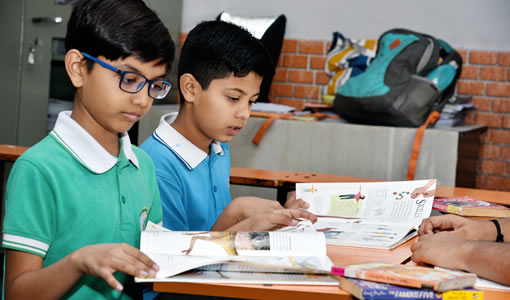
CLASS 1 & 2
- Class I & 2 will have two terms in the academic session:
- Term I – April – September
- Term II – October – March
- Formal testing will be done before the end of the terms.
- On completion of every topic, Revision Work will be taken up in the form of written assignments and oral tasks (in subjects English, Hindi, Math, Gujrati and EVS).
- Performance of the child in these Revision Assignments along with General Observation comprises his/her term wise Continuous Assessment.
- Revision Assignments will be done as a part of routine class work at regular intervals.
- Physical Education and activities like Dance, Music and Art will also be also assessed.
- Grades based on a 7 point scale is awarded in each subject.
CLASS 3 to 5
-
- Classes 3, 4 and 5 will have two terms each in the academic session:
- Term I – April – September
- Term II – October – March
- Each Term will have one round of Periodic Test, one Term Exam and one round of Subject Enrichment Assessment in each subject (English, Hindi, Math and EVS).
- Each round of the Periodic Tests will have one test per subject of 20 marks.
- Term Exam for each subject will be of 60 marks.
- Each round of Subject Enrichment and notebook assessment in every subject will be of 5 marks.
- Classes 3, 4 and 5 will have two terms each in the academic session:
- Final Result = Term I + Term II
= 20 % + 80 %
= 100 % marks - Grades based on a 9 point scale will be awarded in each subject.
- Students will be evaluated for Computer Science and General Awareness once during each term for which letter grades will be awarded on a 9-point Scale.
- Physical Education and activities like Dance , Music and Art will also be assessed.
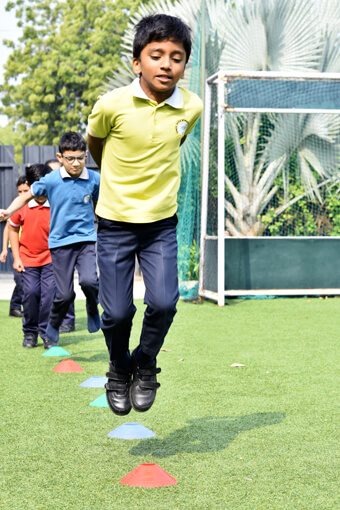
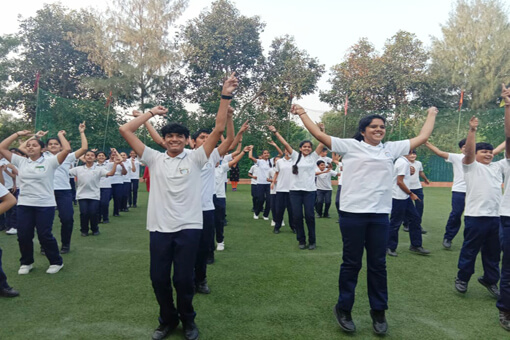
CLASS 6 to 8
- Classes 6 to 8 will have two terms each in the academic session:
- Term I – April – September
- Term II – October – March
- Each Term will have one round of Periodic Test, one Term Exam and one round of Subject Enrichment Assessment in each subject.
- Each round of the Periodic Tests will have one test per subject of 40 marks.
- Term Exam for each subject will be of 80 marks.
- Each round of Subject Enrichment Assessment and notebook assessment in every subject will be of 5 marks.
- Final Result = Term I + Term II
= 20 % + 80 %
= 100 % marks - Grades based on a 9 point scale will be awarded in each subject.
- Students will be evaluated for Computer Science and General Awareness once during each term for which later grades will be awarded on a 9-point Scale.
- Physical Education and activities like Dance , Music and Art will also be assessed.
CLASS 9 to 12
- Classes 9 to 10 will have two terms each in the academic session:
- Term I – April – September
- Term II – October – March
- Each Term will have one round of Periodic Test, one Term Exam and one round of Subject Enrichment Assessment in each subject.
- Each round of the Periodic Tests will have one test per subject of 20 marks.
- Term Exam for each subject will be of 60 marks.
- Each round of Subject Enrichment and notebook Assessment in every subject will be of 5 marks.
- Final Result = Term I + Term II
= 20 % + 80 %
= 100 % marks - Grades based on a 9 point scale will be awarded in each subject.
- Students will be evaluated for Computer Science and General Awareness once during each term for which letter grades will be awarded on a 9-point Scale.
- Physical Education and activities like Dance , Music and Art will also be assessed.

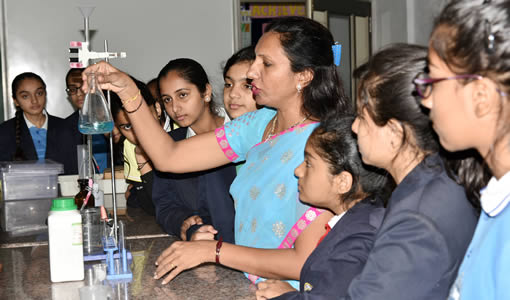
INQUIRY APPROACH
All subjects are dealt – with using the scientific approach of Inquiry Based Learning that involves engaging visuals presentation formats , and well-crafted activities to arouse leaners curiosity. It taps into the procedural , manipulative , observational , drawing , reporting and interpretative skills of the learners , hence enabling them to better grasp the key concepts .
PROBLEM SOLVING SKILLS
PROBLEM SKILLS – are drilled by engaging learners in identifying problems , and by applying previous knowledge to solve them through reasoning and formulating conclusions. learners develop the basic ability to solve problems and apply learning in real life and new situations . they develop a deeper understanding of concepts by solving problems.
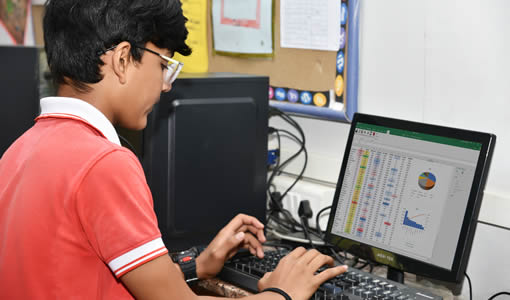
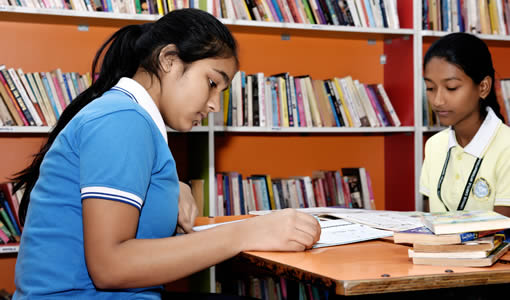
THINKING SKILLS
THINKING SKILLS – profound thinking requires both imagination and intellectual ideas. to produce excellence in thinking we engage our learning in a curriculum that overlaps the logical and the imaginative. our curriculum provides students with ample oppurtunities to practice higher order thinking.

